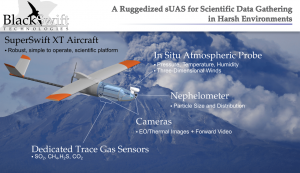01 May NASA Selects BST’s UAS for Volcano Ash Monitoring
Unmanned Aircraft Engineered for Scientific Data Gathering in Extreme Environments
Boulder, CO – (May 1, 2017)
With a legacy of delivering reliable, robust, and highly accurate Unmanned Aircraft Systems (UAS), NASA has awarded Black Swift Technologies (BST), a specialized engineering firm based in Boulder, CO, the contract to develop and deliver a purpose-built scientific platform to explore volcanoes in order to improve air traffic management systems and the accuracy of ashfall measurements. BST will deliver to NASA a tightly integrated UAS solution consisting of an airframe, avionics, and sensors specifically designed to measure selected gases and atmospheric parameters including, temperature, pressure, humidity, and 3D winds as well as more advanced measurements such as particle sizing and trace gases.
Based on BST’s commercially available SuperSwift™ airframe and SwiftCore™ Flight Management System—which have been proven in the field to provide a cost-effective, powerful, and easy-to-operate— the SuperSwift™ XT [figure 1] is specifically engineered to meet the demands of high altitude flights through strong winds and damaging airborne particulates typical of nomadic scientific field campaigns in harsh environments.
“NASA and similar scientific agencies require deliverables with a high degree of accuracy and reliability,” emphasizes Jack Elston, Ph.D., CEO of Black Swift Technologies. “The SuperSwift™ XT will be designed to collect data in harsh environments and will enhance the performance and utility of NASA’s Airborne Science fleet.”

Figure 1: The SuperSwift XT and its specialized payload.
Member organizations of NASA’s Airborne Science Program can all benefit from the measurements provided by this system in various atmospheric conditions using different sensor payloads which, by design, are easily interchangeable. The UAS will provide targeted, in situ observations from previously inaccessible regions that can significantly advance NASA’s goal of safe, efficient growth in global aviation by aiding in the collection of scientific data from which predictive Volcanic Ash Transport and Dispersion models (VATD) can be used to inform air traffic management systems.
Leveraging BST’s proprietary Mission Planning Software, scientists can program the SuperSwift™ in minutes to calculate the area under review and then begin collecting data for immediate analysis and decision making. With its intuitive tab-driven interface, flight planning is simple and easy to accomplish.
Mission monitoring and mapping is all done from a handheld Android™ Tablet loaded with BST’s SwiftTab™ software. Gesture-based controls enable users to confidently deploy their SuperSwift™ with minimal training while being able to collect data over geography that is topically diverse with confidence.
A Fully-Integrated Solution
The existence of a UAS capable of carrying the necessary instruments routinely through harsh environments adds an invaluable contribution to the calibration and validation of data collected from ground- and satellite-based methods. The flight envelope, concept of operations (CONOPS), and rugged nature of the SuperSwift™ XT will permit researchers to collect data previously unobtainable through traditional data collection methods or existing UAS. This includes gathering difficult to obtain data sets such as from volcanic plumes shortly after eruption (i.e., particle size-frequency distribution, vertical ash concentration distribution, SO₂ flux, etc.).
The innovations of the SuperSwift™ XT, including the total sensor suite, can be utilized for scientific research by federal and state public agencies and other state-funded laboratories to collect data on coherent atmospheric structures such as smog, volcano plumes, wildfire smoke, chemical fires, forest humidity, etc. Commercial applications for private industry exist as well, such as utilizing the SuperSwift™ XT to assess the composition, and relative danger, of chemical fires at refineries or the chemical composition of smokestack exhaust.
About Black Swift Technologies
Founded in 2011, Black Swift Technologies LLC, develops custom unmanned aircraft system (UAS) solutions leveraging the SwiftCore™ Flight Management System (FMS) consisting of the SwiftPilot™ autopilot system, the SwiftTab™ tablet-based user interface, the SwiftStation™ ground station, and application-specific sensor integrations. The SwiftCore™ FMS is designed to be modular, robust, and simple to operate allowing users to focus on data products.
In addition to the SwiftCore™ FMS, Black Swift Technologies has unique capabilities to develop and deploy advanced unmanned aircraft systems (UAS) due the team’s combined expertise in the design, implementation, and analysis of advanced “smart” control systems, expertise in legal and safe flight operations in the United States airspace, and their practical experience and knowledge from thousands of hours of UAS flight operations in demanding conditions. The SwiftCore™ FMS enables advanced control systems. These “smart” control systems provide industry leading sensor-based control of the UAS that minimizes operator workload while improving the quality of the observed data by autonomously modifying the flight path based on sensor inputs.
